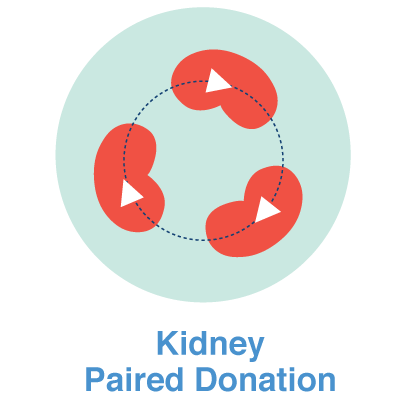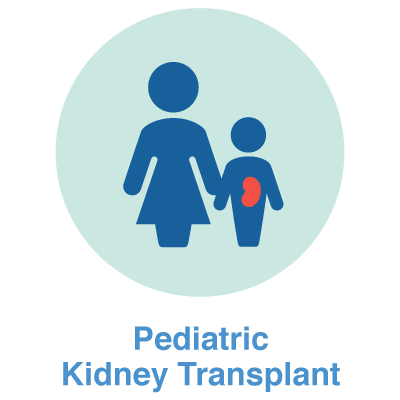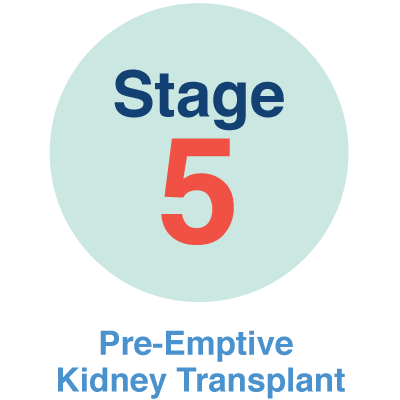Kidney Transplant Process
Our transplant team guides patients and families through every step of the transplant process.
Explore Our Kidney Transplant Process
At Memorial Transplant Institute, we’re committed to providing a personalized kidney transplant experience. Our dedicated team of specialists tailors your care to meet your unique needs and circumstances.
We guide patients and families through every facet of transplant care — from our comprehensive evaluation process to attentive follow-up care that continues for the rest of your life.
To make an appointment or learn more about our personalized approach to kidney transplantation or kidney donation, call
954-265-7450Kidney Transplant Education

The Kidney Transplant Process at Memorial
At Memorial Transplant Institute, we provide high-quality, personalized transplant care. Here’s an overview of the first steps involved in the kidney transplant process:
- Referral: We accept referrals from nephrologists, primary care doctors, social workers and family members. You can also refer yourself.
- First contact: Soon after we receive your referral, a member of our transplant team will call you to explain how the kidney transplant process works. One of our compassionate coordinators will be by your side throughout the entire transplant process, helping you schedule appointments and providing support at every step.
- Initial meeting: At your first visit, you will learn how to access our kidney transplant education video that covers everything you need to know about the kidney transplant process. You’ll also meet our entire care team.
- Evaluation: Next, you’ll go through a comprehensive evaluation that assesses your physical and emotional health. This evaluation includes blood pressure screening, bloodwork and other medical tests. Our coordinators can help you gather medical records and can schedule many tests here at Memorial, or at other locations convenient for you. After your evaluation is complete, our entire care team will meet to discuss whether you may be a candidate for kidney transplantation.
The idea of getting transplant surgery can be overwhelming, which is why we go out of our way to address any questions or concerns you have at any point along the way. Our team is committed to providing you with the best possible care as well as with the support and information you need to feel as comfortable as possible.
Here's what to expect:
Before surgery
You'll first go through a comprehensive evaluation that assesses your physical and emotional health. If our care team determines that kidney transplantation could benefit you, we then discuss your donor matching options. Patients with a suitable living kidney donor can get transplanted within months. We add all eligible patients to the United Network for Organ Sharing (UNOS) kidney transplant list, which matches organs from deceased donors with individuals based on the severity of their condition. The healthier you are heading into surgery, the more likely the surgery will be a success. Learn more about how you can optimize your health while waiting for a kidney transplant.
Time of surgery
Patients who are receiving an organ from a living donor will come to the hospital at the same time as the donor. We will schedule surgery at a time that's convenient for both donor and recipient. If you are receiving a kidney from a deceased donor, your transplant coordinator will call you when a kidney from a suitable donor becomes available. This call could come at any time, day or night.
Preparing for surgery
Your care team will give you specific instructions to prepare you for surgery. You may be asked not to eat or drink after a certain time on the day before surgery.
Arriving for surgery
Your care team will tell you precisely where to go on the day of surgery. When you come to Memorial Transplant Institute, clear signage, valet parking and our friendly team members all help to make the transplantation process easier for you and your family.
During transplant surgery
Kidney transplant surgery generally lasts 2 to 4 hours. Our care team uses general anesthesia, so you are asleep and pain-free during the whole procedure. During kidney transplant surgery, a surgeon will:
- Make a tiny incision near your groin, or lower abdomen
- Place the donor kidney inside your body, in most cases leaving your failing kidney in place
- Connect the healthy kidney to necessary blood vessels and other structures
- Close up the incision
Kidney transplant recovery
After surgery, we'll move you to a room on our dedicated transplant floor. Our care team will monitor you closely until your new kidney starts working effectively.
Your new kidney may start working right away or within a few days. You can expect to stay in the hospital for at least four to five days.
Hospital discharge
Before you go home, our transplant team will sit with you to explain everything you need to know about taking excellent care of yourself and your new donor kidney moving forward. We will:
- Explain the important medications you need to take
- Help you manage any pain or discomfort
- Tell you what signs warrant a call to your transplant coordinator or doctor
- Give you an educational booklet, so you have all of this information nearby once you're home
While many people say they feel healthier and more energized after kidney transplant surgery, different people experience different benefits — and challenges — during the recovery. Whatever your unique experience, our entire care team is committed to helping you transition successfully into a fuller, more active life after kidney transplantation.
You'll benefit from our:
- Postoperative care in the hospital: Your new kidney may start working right away or within a few days after kidney transplant surgery. You can expect to stay in the hospital for at least four to five days. Before you go home, our transplant team will sit down with you to explain everything you need to know about taking excellent care of yourself and your new kidney moving forward. We'll also set up your first follow-up appointment before you head home.
- Comprehensive follow-up care: For the first month after surgery, you'll have regular bloodwork and other tests. You'll also complete specific logs related to your weight, blood pressure, temperature, fluid intake and blood sugar (if applicable). We'll see you for several follow-up visits so we can monitor your kidney function and overall health. As time passes, you'll see us less often. But we'll remain in regular contact with you and your primary care doctor or nephrologist to ensure your health for the rest of your life.
- Convenience: At Memorial, you’ll see all transplant specialists in one convenient location – often in the same visit. You can also get necessary bloodwork done here, so you have one less stop to make in your transplant care. See why so many people choose Memorial Transplant Institute’s kidney transplant program.
- Thorough education: Our caring team members will walk you through everything you need to know — about important medications, signs of organ rejection and common complications. Proper handwashing is a great step you can take to avoid infection after surgery. We'll give you all the information you need to help you succeed in your recovery.
- Support services: Your kidney transplant recovery time will depend on a number of factors, but many people find themselves enjoying a more active lifestyle within one or two months after transplant surgery. If you are experiencing complications or having a hard time emotionally, we're always available to help.
Your life after kidney transplantation will change in many ways, from the kind of medical care you need to your energy levels and so much more. Start preparing yourself for what's to come by learning about our resources for patients and families. You can also read our kidney transplant caregiver tips.
Waiting for a deceased donor kidney transplant can take an average of three years, or longer. At Memorial Transplant Institute, our dedicated transplant specialists understand how stressful this waiting period can be. We stay in close contact with patients and provide the support you need to ensure you’re ready for kidney transplant surgery at a moment's notice.
Before Kidney Transplant Surgery: How to Prepare
We add all eligible patients to the United Network for Organ Sharing (UNOS) kidney transplant list, which matches organs from deceased donors with individuals based on the severity of their condition. Because there are more people in need of a kidney than available organs, most people wait at least three years for a deceased donor kidney transplant.
Our team is committed to working with patients to ensure you're ready for transplantation when a donor organ becomes available. We:
- Tell you what to expect: Someone waiting for a kidney could receive a call that an organ is available at any time — day or night, even on a weekend or holiday. Because of the timely nature of transplantation, once a donor organ becomes available, you'll be asked to come to the hospital immediately. As soon as you're eligible for the national kidney transplant list, our transplant coordinator will start preparing you for what to expect when you receive the organ offer call.
- Help you keep track of medical tests: There's no time to redo medical tests once an organ becomes available, so up-to-date medical tests are essential for transplantation. Certain tests need to be repeated yearly (or more often). We'll help remind you of testing requirements and give you tips to help you keep track of testing dates.
- Provide regular follow-up care: If you're waiting to be matched to a deceased donor kidney, we'll see you every six months or sooner to monitor your health. During these visits, our team will also ask about the support network available to you and ensure that a plan for who will take care of you after kidney transplant surgery is still in place.
- Support you at every point: Our caring professionals will point you to resources that can help you cope with any anxiety or stress you may feel during the waiting process. We'll make sure you know that you can always reach out to us with any questions or concerns you have.
There's more than one way to perform a kidney transplant. At Memorial Transplant Institute, our surgeons skillfully perform a range of kidney transplant surgeries. Our organ transplant expertise and innovative approach to donor matching help us make life-saving kidney transplantation possible for more people in Broward County and South Florida.
Kidney Transplant Options at Memorial Transplant Institute
Our skilled surgeons have years of experience performing innovative, complex transplant procedures. These include:
Deceased kidney donor transplant: This type of kidney transplant uses an organ from a deceased donor. All people eligible for a kidney transplant go on a national waiting list. The list matches organs from deceased donors with individuals in need of a transplant, based on different criteria such as the severity of their condition. Because there are more people in need of a kidney than available organs, most people wait at least three years for a deceased donor kidney.
Living kidney donor transplant: When possible, we prefer to match our patients with a suitable living kidney donor. A living kidney donor transplant offers many benefits over deceased kidney donor transplants. For example, a living donor kidney could function for twice as long as an organ from a deceased donor. Learn more about the selfless act of living kidney donation.

Kidney paired donation: Sometimes, testing shows that a patient and their preferred living kidney donor aren't a suitable match. In this case, we connect patients with national paired-kidney exchange programs, which helps identify strong patient-donor matches.

Pediatric kidney transplant: The pediatric-trained specialists at Joe DiMaggio Children's Hospital provide specialized care for children who need a kidney transplant. As our young patients become teenagers, they transition to our adult program, ensuring seamless transplant care over their entire lifetime. Learn more about pediatric kidney transplant.

Pre-emptive kidney transplant: Some patients with stage 5 chronic kidney disease may be considered for pre-emptive kidney transplant. In this case, we can often perform kidney transplant surgery before a patient starts dialysis.
Double transplant capabilities: Because some anti-rejection drugs can harm the kidneys, heart transplant patients sometimes require a subsequent kidney transplant. We offer those patients the benefit of consistent, seamless care throughout both transplants.
Your life after kidney transplantation will change in many ways, from the kind of medical care you need to your energy levels and so much more. Start preparing yourself for what's to come by learning about our resources for patients and families. You can also read our kidney transplant caregiver tips.
To make an appointment or learn more about our personalized approach to kidney transplantation or kidney donation, call
954-265-7450
Patient and Family Centered Care
We treat patients and family members as partners in healthcare.
It matters to you. It matters to us.
Quality and Safety Data for Memorial Healthcare System
Our goal is to provide our patients with the information they need to make informed choices for themselves and their families.
View Quality and SafetyYou have a Right to Know About Prices
We want to give you the information you need to make important healthcare decisions, including the costs of our services.
View PricingMyChart Portal
View test results, schedule follow-up appointments, request prescription refills and more.
Login or Sign-up to MyChart
